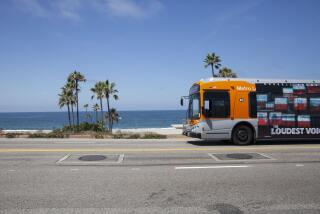A Train Bound for Trouble
- Share via
Kathleen’s deep blue eyes were troubled, but not by the gray skies and cold rain pelting the windows of our train. She looked at me, her trusted husband and travel guide, and whispered, “Do they still throw people off moving trains in these countries?”
We were traveling between former Warsaw Pact cities, from Prague, Czech Republic, to Bratislava, the capital of Slovakia, about 200 miles to the southeast. It was 1997, not 1977, so it shouldn’t have been so alarming that we were on the other side of the former Iron Curtain. But it was our first trip to Eastern Europe, and--here comes the critical part--we didn’t have valid tickets.
We weren’t stowaways, just tourists gone a bridge too far in do-it-yourself travel planning. It seemed like a simple mix-up, one of those glitches often encountered by independent travelers who shun the safety of organized tours. A day earlier, our hotel concierge in Prague had taken our rail passes to Holesovice Station and returned with official-looking seat passes. All was in order, or so we thought.
But for the six-hour trip to Bratislava, Kathleen and I found ourselves in our own mission impossible, evading a grim-faced conductor, hiding out in restrooms and eventually being escorted by Slovakian soldiers to who-knows-where.
Our adventure began 30 minutes out of Prague, when the EuroCity conductor slowly examined our tickets. His meticulous inspection revealed a discrepancy. Our passes weren’t validated with the stationmaster’s date stamp.
We had never used a rail pass. Thinking the prepaid passes and the concierge-provided seat assignments were sufficient, we had gone directly to the train platform, bypassing the ticket office with its important stamp.
The conductor mixed German, French and a few English phrases, insisting that all passes had to be stamped. With dark eyes peering from behind a curtain of bushy eyebrows, he looked like the stereotypical Communist bureaucrat stuck in ways of the past. An axiom of capitalism--the customer is always right--wasn’t going to work here.
“But we have to get off the train to get passes stamped,” Kathleen said. I added that the express train stopped for only two minutes at a time--not enough time to hop off, get stamped and hop back on. The next train, a slow-running local, was hours away. But the conductor just shrugged and walked away.
Suddenly the express started braking for a station. I clasped Kathleen’s hand. “Hide in the restroom during the stop,” I whispered. A plan was coming together.
We parted ways and locked ourselves behind lavatory doors. I could hear passengers shuffling off the train. There was a loud knock at my door. Was it the conductor? I leaned against the door in case the latch wasn’t enough.
After what seemed like an eternity, the train rocked into motion. When I opened the door, an irritated passenger slipped past me into the restroom.
I reclaimed my seat, but Kathleen was nowhere in sight. The train was at full speed before she cautiously cracked open her restroom door and, seeing no conductor, hurried back to her seat.
The next stop was Brno, the last station before the train left the Czech Republic and entered Slovakia. The crew was to change, and so too, we hoped, our fortunes.
“One more and we’ve got it made,” Kathleen said.
Her optimism shattered when the conductor reappeared. “We’ll get the date stamp at Brno,” I promised this time. “Much bigger station than Havlickuv.”
Foiled for the moment, the conductor left.
“OK,” Kathleen said. “How do we get through Brno? We can’t fool this guy again.”
Easy, I told her. We’ll vary the plan. Kathleen would stay in the seat, and I would pretend to get off with the other passengers. At the last minute, I would slip into the restroom. If the conductor showed up, Kathleen would tell him I was in the station. If we could hold on until the train started rolling again, the new conductor would have two options: Let us stay, or throw us off a moving train.
“Well,” Kathleen said, “what if he pulls the cord, stops the train and throws us off in the middle of nowhere?”
My response: “No plan is foolproof.”
I don’t know which was more pathetic, our haphazard little scheme or the fact that it worked. When I was back in my seat after the stop in Brno, the train raced about 35 miles toward Breclav, where the replacement Slovakian crew awaited.
But before we reached the station, the conductor reappeared. I told him I hadn’t been able to find anyone to stamp our passes during the short stop. He was not amused. But as the train slowed for Breclav, he merely picked up his duffel bag and exited. Victory, we thought.
“Oops!” Kathleen said.
On the station platform, the conductor pointed to our window while carrying on an animated conversation with two Slovakian soldiers dressed in drab wool uniforms. Each wore a garrison cap emblazoned with a red star, a sign that Slovakia remained one of the most socialist of the former Eastern Bloc countries.
Minutes out of Breclav, the new conductor, flanked by the soldiers, asked for our tickets. “Guided tour next time?” Kathleen asked softly.
The Slovakian conductor took a different tack. Our Czech Flexipass was not valid in Slovakia, he claimed, because the two countries had separated. He wanted the equivalent of $48 for the fare to Bratislava.
We didn’t have Slovakian korunas, and the conductor wouldn’t take Czech korunas. The soldiers motioned for me to stand. The conductor ordered us to the dining car, which apparently took credit cards.
Marching between soldiers and the conductor, I headed toward the dining car. Kathleen was quickly at my side. “I want to see how this ends,” she said.
We entered the diner and found it empty--no steward, no credit card machine.
In perhaps my smartest move of the day, I opened my wallet, pulled out a $20 bill and asked, “Is cash all right?”
The conductor pocketed the bill. Kathleen, in not her smartest move of the day, asked for a receipt. The conductor pretended not to hear.
“But it’s a bri . . . “ Kathleen said before I gripped her hand and stopped her from finishing the sentence.
The next morning, after a night in Bratislava, we were aboard a hydrofoil bound for Budapest, Hungary, with Kathleen’s sense of humor intact. Knowing I had purchased the boat pass in California, she suggested we don life jackets, “in case they throw people overboard in these countries.”
I handed her the hydrofoil tickets. They were covered with stamps--black ones, red ones, blue ones, round ones, square ones. Bratislava’s harbor master had been most obliging to an American who “collects official-looking foreign stamps for friends back home.”
More to Read
Sign up for The Wild
We’ll help you find the best places to hike, bike and run, as well as the perfect silent spots for meditation and yoga.
You may occasionally receive promotional content from the Los Angeles Times.






